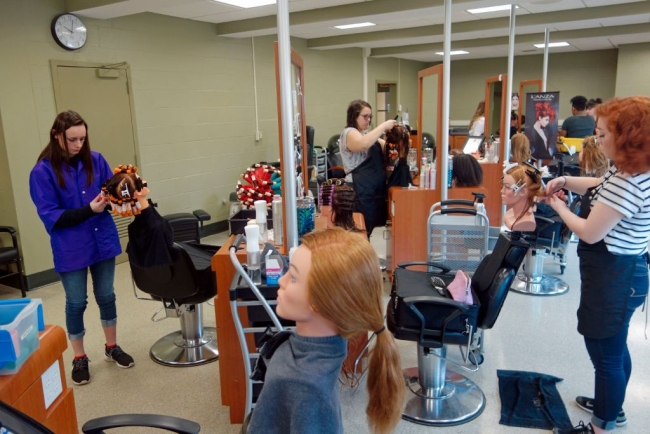You have /5 articles left.
Sign up for a free account or log in.

Cosmetology students
Getty Images
On at least one occasion, a for-profit cosmetology college used a state law to stop a community college from creating a new program that would compete with it. But higher education experts said such incidents are rare.
A recent article in The New York Times revealed that the Iowa Cosmetology School Association and La’ James International College, which owns six beauty schools in the state, in 2005 sued Iowa Central Community College to stop the public two-year institution from starting a cosmetology program. Many observers called the revelation indefensible for a sector that boasts of market-based offerings and has long complained about regulations that prevent it from being on an even playing field with public colleges. However, the Iowa case may be an outlier.
“This circumstance appears to be unique to Iowa,” David Baime, senior vice president of government relations and policy analysis at the American Association of Community Colleges, said in an email. “But it is deeply disturbing that students are being deliberately prevented from accessing a more economical education.”
Tuition, fees and living expenses to attend La' James in Cedar Falls totaled more than $41,000 last year, according to federal data. Total expenses for a student attending Iowa Central were about $16,000 in 2017.
Last year, Iowa Lakes Community College announced plans to also offer a cosmetics degree. Valerie Newhouse, the college's president, told the Times that it also had received a threat of litigation from a for-profit beauty school. But officials at Iowa Lakes said no litigation has been filed against the college to stop the proposed program.
In the 2005 lawsuit, La’ James and the Iowa cosmetology association cited a part of the Iowa state code that prohibits public entities from competing with private ones. A similar challenge happened in 1990, when the private American Asbestos Training Center sued Eastern Iowa Community College. However, a district court found that asbestos training courses offered by the community college did not violate the state code.
Besides Iowa, a few other states prohibit duplicative college programs. For example, in New Jersey the state Presidents’ Council can deny any proposed program that is “unduly duplicative or expensive.” The council is composed of presidents from the state’s public universities, community colleges, for-profit and private nonprofit institutions.
William Austin, a member of the council, has served as Warren County Community College’s president for 15 years. Austin said he can’t recall the council ever rejecting a program completely.
“There are times when things are sent back, but the for-profits have never done that at all,” he said. “I don’t know how a for-profit that relies on the free market could make that argument, and in New Jersey, it’s a collegial group that works together.”
Austin said two program proposals are still waiting for approval. Those two would allow community colleges in the state to offer bachelor’s degrees in nursing.
Some states have resisted allowing community colleges to offer four-year nursing degrees -- often at a lower price than public universities -- because of competition. California, for example, has not included nursing in a pilot program of new bachelor’s degree programs at community colleges. And a bill recently introduced in the California Senate would establish a central higher education coordinating office that would require academic programs to not be duplicated among the state's public, private and for-profit institutions.
Austin said anybody not in favor of four-year nursing degrees offered by community colleges is on the wrong side of history.
Cosmetology Closures
Few community colleges offer cosmetology programs.
Two-year public colleges comprise just 18 percent of institutions that award cosmetology certificates, according to Noah Black, a spokesman for the Career Education Colleges and Universities, which represents many for-profit institutions.
“It’s a small percentage but a very important percentage,” said an owner of a national for-profit beauty school chain, who asked to remain anonymous. “Community colleges serve a wonderful purpose in our community. What happened in Iowa in the early 2000s is just an outlier. I haven’t heard anything similar nationally.”
Over the next 10 years, an estimated 1.3 million barbers, cosmetologists and aestheticians will be needed to meet the demand for beauty services nationally, the owner said, and beauty schools are not growing as rapidly as that demand.
Closures have been common in recent years. A combination of increased regulatory scrutiny through the gainful-employment rule, which uses a debt-to-earnings ratio to determine if graduates can pay back their loans, and low unemployment have forced some major cosmetology schools to shut down.
The gainful-employment rule, despite being put on hold by Education Secretary Betsy DeVos, remains a looming concern for career education colleges. One of the largest beauty school operators -- Regency Beauty Institute -- shut down in 2016 and cited the federal regulation as a threat. Institutions that fail to meet the gainful-employment rule risk losing access to federal financial aid.
The rule also made programs with high numbers of required school hours more expensive, said Trace Urdan, managing director at Tyton Partners, a higher education consulting firm. The more hours students spend in school, the more debt they're likely to accrue, which reflects poorly in the gainful-employment metrics.
For example, Iowa requires 2,100 hours for a cosmetology certificate. The Times found that the requirement was far more than for some medical professions, such as emergency medical technician, and more than the cosmetology hours in other states. Some states are dialing back those requirements. Rhode Island recently passed a bill that lowered its required hours for cosmetology students from 1,500 to 1,200.
Urdan said he isn’t aware of any for-profits that are seeking to keep the required number of hours inflated because of the presumed effect of a return of the gainful-employment rule.
“It squeezed them literally out of business,” he said. “School closures have been in the highest-credit-requirement states.”




